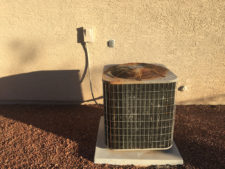Blog
How Long Will My Air Conditioner Last Before I Need to Replace It?
What do you do when your air conditioner quits working? Should you get it serviced or should you consider replacing your unit? There comes a point where it makes more sense to install a new unit and forgo repair, so let’s look at how you can make that determination.
What is the average lifespan of an air conditioner?
The lifespan of an air conditioner depends on several factors, but a well-maintained, regularly tuned up air conditioning system will last up to 15 years. A poorly maintained air conditioner will begin lagging much sooner.
Investing in routine HVAC maintenance by a licensed technician will significantly extend the life and efficiency of your air conditioner.
How can you tell that it’s time to replace your air conditioner?
There are several signs that indicate your air conditioner is reaching the end of its lifespan.
1. Increased Energy Bills
A climb in your utility bills can indicate several things, including leaks, blocks, and energy loss. What it mainly communicates, however, is a loss in overall air conditioner efficiency. If you notice your energy expenses increasing without much explanation, it might be a sign that your air conditioner is failing.
2. Age
The average air conditioning unit lasts 10-15 years. If your AC unit needs repairs in excess of $400 and it’s 12 years old, we recommend looking at replacements. If replacement is not in this year’s budget, you can make the repair, but keep in mind that older units continue to need fixing and you should probably plan for a new air conditioner soon.
New systems typically come with a 5-10 year warranty. So your savings in repairs could equal the cost of the new unit.
3. Uneven Cooling
Uneven temperature distribution is another sign that your air conditioner is malfunctioning. Unless you have a zoning system, rooms should be equally cool and comfortable.
4. Strange Noises and Excess Dust
A noisy system indicates improper duct sizing, while dusty air indicates leaks in the ductwork. Faulty ductwork can certainly be fixed, but if the problem goes on too long or becomes too complicated, it is often easier to replace the entire system.
5. Poor Humidity Control
One of the functions of your air conditioner is to pull humidity from the air while recirculating dry, cool air. If you notice that your indoor air quality is sticky and humid, it might be the fault of an inefficient air conditioning unit.
There comes a time when it makes more sense to replace your old, worn out air conditioner rather than to keep investing in repairs. Regular inspections and keeping an eye on efficiency can help extend the life of your system.
If you have any further questions, or if you would like to schedule an air conditioner tune-up, contact Indoor Air Quality today. We serve homeowners in Highlands Ranch and throughout the Denver Metro Area. Our highest priority is the comfort of your home.





